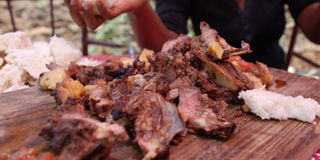Your diet could cause rectal prolapse

Changes in diet are usually enough to improve or reverse a prolapse of the lining of the rectum (partial prolapse). Courtesy photo
For as long as he can remember, part of Alfred Okumu’s rectum comes out at intervals. “When it comes out, I always take a week off work because in that condition, I cannot sit comfortably. I actually get a fever because during that week I do not eat for fear of going to the toilet for a long call.”
Okumu believes the cause of his problems lies in his diet. “I was brought up to appreciate that real foods only include millet bread, potatoes, and cassava. I eat them almost every day. As such, passing stool is always an ordeal for me.”
Rectal prolapse is a condition where loose tissue in the wall of the rectum slides down and hangs out of the anal opening. Dr Isaac Newton Otyono of God’s Care Medical Clinic Seeta, says a complete rectal prolapse is possible when the entire wall slides out.
“This condition is, however, gradual. In the beginning it may only occur when one is passing stool but eventually, the entire wall sticks out. It is a condition that is not specific to any group and can affect anyone from children to older adults.”
Your diet is an indication
A diet that is purely made of carbohydrates is a risk factor for rectal prolapse. This is especially so if after eating these foods, one has to strain in the toilet to force out the hard stool. “A diet that is restricted to meat products, saturated fats, alcohol, and refined grains will cause constipation and turn one’s stool into pellets,” Dr Otyono says, adding: “This means that the person has to use physical effort to push out the stool.”
To loosen up stool, it is advisable to have a starch-based diet, full of vegetables and fruits.
Unhealthy slimming methods
Nowadays people, especially young girls engage in unhealthy ways of losing weight, such as drinking endless cups of Chinese slimming tea, which causes consistent diarrhoea.
“Chronic diarrhoea could also cause rectal prolapse because it makes it difficult for the rectum to hold stool. Chronic diarrhoea is also caused by irritable bowel syndrome.”
Overtime, severe diarrhoea can tear up the anal tissue, making it more difficult and painful for one to have consistent bowel movements.
Exercise
“Even some exercises that strain the pelvic muscles can lead to rectal prolapse. For instance, heavy weight lifters are prone to the condition because when lifting weights, they apply a lot of pressure to the lower abdomen, loosening the muscles,” Dr Otyono says.
Symptoms
Usually, the first sign of rectal prolapse is the feeling of a bulge or protrusion from the anus, especially after a bowel movement.
Dr Otyono says: “In the beginning, the protrusion will go back when one stands. However, with time, one will usually have a feeling that they must run to the toilet quickly for a bowel movement. This usually occurs when they lift heavy things, cough or sneeze.”
He adds that as the prolapse stretches the anal opening, there will be a feeling that the rectum is always full even after passing stool. At this point, liquid stool will begin to leak.
Leaking stool can bring embarrassment to the patient because of the accompanying odour. To curb it, large quantities of toilet paper have to be used because when not properly cleaned, the anal area is prone to infections.
Rectal prolapse comes with accompanying pain and inability to sit for long periods of time.
Treatment
Because some people may find rectal prolapse an embarrassing condition, they suffer in silence. However, one should visit a physician. “The physician, depending on the results they get after examining the patient, will give recommendations. In a partial prolapse, the rectum can be manually pushed back. This should be done by an experienced person who will ensure that infection control is key,” Dr Otyono advises.
Do not use sharp objects to push back the rectum because this will damage the tissues. It is advisable that after the procedure, one should take a course of antibiotics to treat any opportunistic infections that may arise.
“If the entire rectum is hanging out, the doctor will recommend surgery. In both treatment courses, there is need for a change of diet to softer foods,” he says.
Necessary lifestyle changes
Start the morning with a glass of warm water to stimulate your bowels into action. This will rule out constipation. “A balanced diet is important, especially if it includes lots of vegetables because they contain the fibre needed to soften stool,” Dr Otyono says.
It is also advisable not to postpone the urge to use the toilet, especially for a bowel movement.
Exercise such as walking, cycling, and swimming also strengthen the pelvic muscles. However, sit-ups, abdominal crunches, and the plank, should be avoided because they strain the pelvic area.
Rectal prolapse from weak anal muscles
• After a virginal birth, due to straining in the labour process, one may suffer rectal prolapse although this is rarely a cause of the condition.
• In older people, especially women, a gradual weakness of the pelvic floor muscles is common.
When not treated
An untreated rectal prolapse increases the risk of damage to the rectum due to bleeding from over wiping after passing stool. A remedy would be to use wet wipes or even water to clean oneself.
When a rectal prolapse cannot be pushed back, there is risk of the blood supply to the prolapse being cut off. This causes a lot of pain to the patient, and a risk of decay and gangrene.




